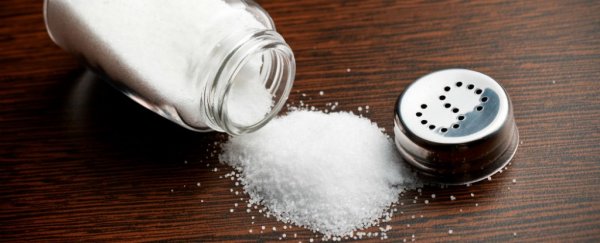New research adds to the debate about just how much salt is good for the body.
According to a study of more than 95,000 people, the vast majority of us aren't being harmed by our level of salt intake, with the tipping point two-and-a-half teaspoons a day.
That's the equivalent of 5 grams (0.18 ounces) of sodium a day. Many experts would recommend a much lower level, often less than half that, to cut down the risk of increased blood pressure and associated health issues.
According to the new research, however, anything below that 5 gram limit isn't enough to increase the risk of cardiovascular disease and stroke. More than 95 percent of people in developed nations are below that level, the study found.
What's more, even levels of salt intake that are too high can be counteracted by a diet that's rich in fruits, vegetables, dairy foods, potatoes, and other potassium-rich foods. Are we worrying too much about salt?
"The World Health Organisation recommends consumption of less than two grams of sodium – that's one teaspoon of salt – a day as a preventative measure against cardiovascular disease, but there is little evidence in terms of improved health outcomes that individuals ever achieve at such a low level," says one of the researchers, Andrew Mente from McMaster University in Canada.
Mente and his colleagues say their study benefits from following communities in 18 different countries over a period of eight years, rather than analysing individuals.
Moderate salt intake – roughly the level many of us are at now – doesn't affect health risk, but particularly high or low levels of salt in our food can cause problems, the statistics in the new study suggest.
Before you head out to the nearest fast food restaurant, however, you should know that the study has come in for a fair share of criticism.
The use of a single urine sample per participant rather than samples collected over 24 hours means the results can't be treated as accurate, according to other scientists. Critics also point out that the inclusion of people suffering from heart disease – who won't eat much or get much salt as a result – skews the figures too.
"The totality of evidence shows that lowering salt intake leads to a fall in cardiovascular disease events, the commonest cause of death and disability worldwide," Graham Macgregor from Queen Mary University in the UK, who wasn't involved in the study, told Alex Matthews-King at the Independent.
That's backed up by plenty of previous research, including detailed research from the American Heart Foundation, which says there is "strong scientific support" for guidelines recommending 1.5 grams (0.05 ounces) of sodium a day.
Too much sodium, which is found in salt and other processed food, retains more water in the body and puts more pressure on the heart, the conventional thinking goes.
The new study isn't alone in suggesting a moderate amount of salt is actually just fine, though. It's become one of the most contentious issues in the science of our dietary health as we learn more about the effect of salt on our bodies.
For the researchers behind the new study, the fact that we're not getting close to hitting sodium targets isn't going to cause a health disaster. Efforts to reduce salt should focus on countries that exceed that 5 gram limit, including China, while the rest of us are going along just fine, they say.
"There is no convincing evidence that people with moderate or average sodium intake need to reduce their sodium intake for prevention of heart disease and stroke," says one of the team, Martin O'Donnell from McMaster University.
The research has been published in The Lancet.
